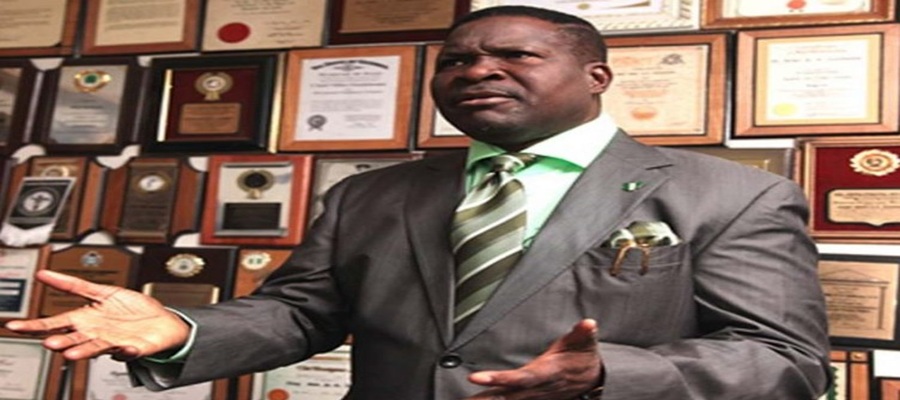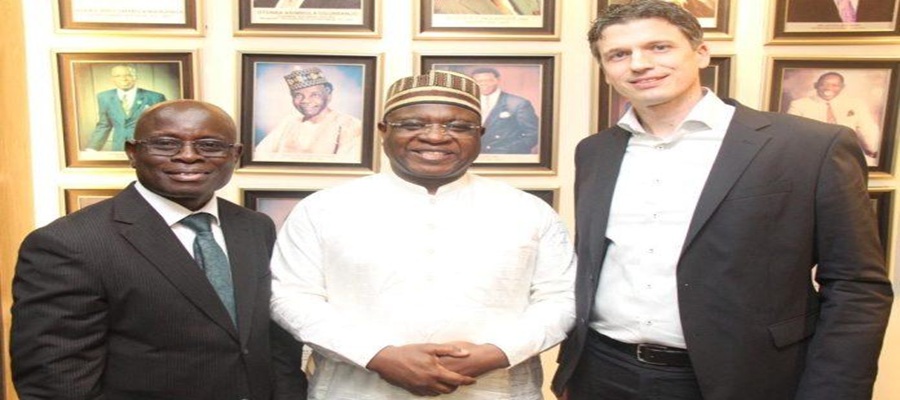News
Uwadia Backs Coderina, Harps on Robotics Programming Skills Test Awareness
Professor Charles Uwadia, head of Computer Science, University of Lagos (UniLag), has applauded Coderina, a Non-Governmental Organization (NGO) vision in promoting Science Technology, Engineering and Math (STEM) education in Nigeria.
Uwadia who spoke to Nigeria CommunicationsWeekduring a FIRST® LEGO® League, an exciting and fun global robotics program that ignites an enthusiasm for discovery, science, and technology in kids ages 9 to 16, said that the programme deserves support from both the Government and the Private sector, as Coderina has shown that sustainability of Science and Technology, Engineering and Education in Nigeria must not be overlooked.
Holding for the first time in Nigeria, but for the penchant interests of SAP, world leading Enterprise Application Software provider and National Information Technology Development Agency (NITDA), the number one ICT agency of the federal government led by the visionary Engr. Peter Jack; as the sponsors.
Other key allies are the University of Abuja as regional host and Dept of Computer Science Unilag,
The FIRST® LEGO® League session held during the weekend at the University of Lagos (Unilag), attracted over 300 students from different schools in the State while 140 of them competed.
With more sponsors and State Governments involvement, the Organisers said they want to take FLL as an annual event to the 36 states of the Federation.
To this end, Uwadia said, “In the area of ICT funding is either here nor there because there is nothing that is really fully funded here in the country. You can only make do with what is available. My own feeling is that even within what is available financially we can still energize our youth to get them to show interest in science and technology, mathematics and eventually take it up as a career.
“I want to thank the organisers, First Lego League for this initiative and also the management of UNILAG for agreeing to collaborate with this group for it to take place here. The programme is very important when we are talking about sustainability of Science and Technology, Engineering and Education in Nigeria.
“And you can only be able to sustain such type of programme if you catch them young, that is you address the very foundation of education.
“The choice of the University environment is to give the youth a feeling of an educational environment different from where they are coming from. Secondly, to create the environment of fun, while learning very serious things like Science, Technology and Mathematics.
“The first thing is that government cannot do it alone. Government is doing its own bit and there is need to actually get the private sector to be involved. They should approach them and lay the cards on the table for them to know what they stand to benefit and I am sure in the coming year they will get more private sector involvement into the programme.
“Well, if it is succeeding in countries like Singapore which is a very small country there is no reason why it cannot succeed here. In 2001 when I was in Australia I met a group of students who were Singapore and they were just diploma students and I was amazed at the kind of things they were doing.
“They were already using Java to write code to be able to move objects in 2001. Here we are in 2015 in Nigeria, it’s not new as this is something we ought to have been doing in Nigeria much early than this time. What is important is that we sustain it.
He added that awareness is very important and that was the reflections of the last week’s programme.
Uwadia said, “Senstization is important and we need to take it much further by allowing it to transit down to the level that even kids at home will be able to play with some robotics, creating awareness at that level to crèche, primary and secondary”.
Earlier, Mr. Olajide Ajayi, director, Coderina/FLL Nigeria, reiterated that technologies offer opportunities to stimulate growth, increase innovation and enable individuals and institutions to interact more productively within the global economy.
However, realizing the possibilities require the need to put technology at the core and also as a part of a mix of productive changes and supporting capabilities.
The Director said that matching resources by resourcefulness and combining such efforts with initiatives on the part of educators, government and the third sector in the quest to build capacity for our future creative leaders, has become even more essential.
“The tournaments”, the director said, “are a culmination of activities carried out on the World Class challenge (the theme for the 2014/2015 season). In the 2014 FLL World Class Challenge, 265,000 children from 80 countries will re-design how we gather knowledge and skills in the 21st century. Teams will teach adults about the ways that kids need and want to learn”.
FIRST® LEGO® League, he further explained, is an Educational partnership between FIRST® and the LEGO® Group.
“It is a program for a team (comprising of 2-10) of children from ages 9 to 16 with a different challenge/theme issued annually. It has three (3) components comprising of Project, Robot Game and Core Values.
“In the project, teams research a real-life issue related to the theme of the year, create or proffer a new and innovative solution, then present this information (using different presentation models and props) during a timed presentation to the judges. This is followed up by a timed question and answer period.
“The robot game deals with robot design, build and programming to complete a set of missions on a thematic table-top playing surface.
“Core Values – the FLL Core Values are the cornerstones of the FLL program. They are among the fundamental elements that distinguish FLL from other programs of its kind. By embracing the Core Values, participants learn that friendly competition and mutual gain are not separate goals and that helping one another is the foundation of teamwork.
Such values inculcated on the students were to invoke the thoughts as “We are a team. We do the work to find solutions with guidance from our coaches and mentors. We know our coaches and mentors do not have all the answers; we learn together. We honour the spirit of friendly competition. What we discover is more important than what we win. We share our experiences with others. We display Gracious Professionalism® and Coopertition® in everything we do and We have FUN!
The next session holds in Abuja on Saturday, March 21, 2015.
News
ICPC Charges Ozekhome with Forgery, Corruption Over London Property

Independent Corrupt Practices and Other Related Offences Commission (ICPC) has filed a criminal charge against Chief Mike Ozekhome, SAN, alleging his involvement in a corruption scheme connected to a London property.

Chief Ozekhome
The ICPC filed a three-count charge before the Abuja High Court through its Head of High Profile Prosecution Department, Osuobeni Akponimisingha. The charge, marked FCT/HC/CR/010/26 and dated 16 January, names Ozekhome as the sole defendant in the case.
In the first count, the commission alleged that Ozekhome, aged 68 and residing at No. 53 Nile Street, Maitama, Abuja, received a property described as House 79, Randall Avenue, London NW2 7SX, around August 2021. The ICPC stated that the property was purportedly given to him by one Mr. Shani Tali and that the act amounted to a felony contrary to Section 13 and punishable under Section 24 of the Corrupt Practices and Other Related Offences Act 2000.
In the second count, the senior lawyer was accused of making a false document with a Nigerian passport bearing the name “Mr. Shani Tali” around the same period. The commission alleged that the passport, marked A07535463, was intended to support a fraudulent claim of ownership of the London property. The alleged offence contravenes Section 363 and is punishable under Section 364 of the Penal Code CAP 532 Laws of the Federal Capital Territory (FCT), Abuja, 2006.
The third count alleged that Ozekhome dishonestly used the same passport to support claims over the property despite allegedly knowing the document was false, an offence said to violate Section 366 and punishable under Section 364 of the Penal Code.
Supporting documents attached to the charge include an extra-judicial statement allegedly made by the defendant on 12 January 2026, a judgment referenced as REF/2023/0155 dated 11 September 2025, interim forfeiture proceedings relating to the London house, a data page for “Shani Tali,” a letter dated 18 December 2025, and other expected materials.
The ICPC also listed several individuals expected to testify, including investigators Wakili Musa and Tosin Olayiwola, a representative of the Nigerian Immigration Service, and investigators Ebenezer Nduo and Blessing Monokpo, alongside any additional witnesses the commission may call. As of the time of reporting, the case had not yet been assigned to a judge.
The development follows an earlier investigation by the ICPC sparked by a petition from Olanrewaju Suraj, head of the Human and Environmental Development Agenda (HEDA), citing a judgment from a London property tribunal.
The tribunal’s ruling had linked Ozekhome and others to alleged forgery and fraudulent claims of ownership of the North London building. The petition accused several individuals of conspiring with corrupt Nigerian officials to procure forged identity documents for the purpose of “fraudulently claim[ing] ownership” of the property.
News
NGX Unveils Net-Zero Plan for Greener Capital Market

Nigerian Exchange Limited (NGX) has launched the NGX Net-Zero Programme to guide listed companies toward clear carbon reduction pathways and enhanced climate disclosures aligned with global investor standards.

NGX
The high-level launch engaged chief executives of quoted firms alongside development partners including German Investment Corporation KfW, DEG, and African Foresight Group (AFG), NGX’s implementation partner. Issuers and investors discussed financing decarbonisation, sustainability practices, and attracting climate-aligned capital.
NGX Group Chairman Dr Umaru Kwairanga described the initiative as concrete climate action, commending partners for two years of groundwork. “Today marks leadership and decisive action. Climate change has become a core business imperative, with capital markets mobilising capital and setting standards,” Kwairanga said.
He positioned NGX Net-Zero to support emissions measurement, disclosure, capacity building, and sustainable finance access, urging CEOs to embrace it strategically rather than as compliance. Kwairanga reaffirmed NGX’s goal to make Nigeria’s capital market Africa’s green finance hub.
Group CEO Temi Popoola called climate action a business imperative, noting sustainability-embedded firms attract capital, manage risks, and stay competitive. DEG Management Board Member Monika Beck highlighted partnerships scaling impactful, commercially viable climate solutions.
The event closed with a ceremonial gong marking the programme launch and send-off for outgoing DEG Regional Director Bernd Telemann.
News
Nigeria Off EU High-Risk Money Laundering List in Major Financial Win

Nigerian Financial Intelligence Unit (NFIU) has hailed Nigeria’s removal from the European Union’s list of high-risk third countries for Anti-Money Laundering and Countering the Financing of Terrorism (AML/CFT) as a landmark achievement endorsing the nation’s reform efforts.

Nigerian Financial Intelligence Unit (NFIU)
NFIU CEO Hafsat Abubakar Bakari said the delisting, contained in European Commission Delegated Regulation (EU) C (2025) 8460 adopted December 4, 2025 and effective January 29, 2026, affirms sustained AML/CFT and Counter Proliferation Financing (CPF) reforms.
The move follows Nigeria’s exit from the FATF Jurisdictions under Increased Monitoring after addressing strategic deficiencies, alongside Burkina Faso, Mali, Mozambique, South Africa and Tanzania.
Bakari noted the European Commission recognised Nigeria’s strengthened AML/CFT effectiveness, closed technical gaps, and fulfilled FATF Action Plan commitments leading to grey list removal in June and October 2025.
The delisting eliminates enhanced due diligence requirements for EU financial transactions, easing compliance, boosting cross-border flows, and enhancing Nigeria’s appeal for European trade, investment and partnerships.
The NFIU attributed success to President Bola Ahmed Tinubu’s political will and collaboration among National Assembly, law enforcement, regulators, judiciary, private sector and development partners.
The agency reaffirmed commitment to ongoing FATF, GIABA, EU engagement and domestic framework resilience to maintain international confidence in Nigeria’s financial system.

 E-Financial3 days ago
E-Financial3 days agoSEC Hikes Minimum Capital Requirements for Market Operators After a Decade

 Telecom3 days ago
Telecom3 days agoStudy Shows Blocks in Telegram are Pushing the Underground Out

 News3 days ago
News3 days agoNigeria Off EU High-Risk Money Laundering List in Major Financial Win

 News3 days ago
News3 days agoNGX Unveils Net-Zero Plan for Greener Capital Market

 Telecom3 days ago
Telecom3 days agoVodacom Crowned Africa’s Top Employer 3rd Year Running on Innovation, Ethical AI

 Telecom3 days ago
Telecom3 days agoGalaxy Backbone Marks Two Decades of Powering Nigeria’s Digital Evolution

 Telecom3 days ago
Telecom3 days agoGalaxy Backbone Marks 20 Years, Tops FG Website Scorecard

 E-Financial23 hours ago
E-Financial23 hours agoHere Are Nigerian Banks That Have Secured Their Licences



























